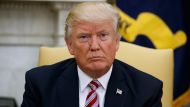It is significant that the fledgling Trump presidency has been brought to the brink of serious crisis, not by his lies, but by his truths.
The president's aides have tried to help. They pretended, for instance, that Trump's reasons for sacking James Comey as FBI director had nothing to do with the ever-tightening investigations into the president's connections to Russia. Then Trump went and blurted out that it really was all about "this Russia thing", breezily blowing his own cover. Same thing this week when Trump's team denied he had leaked sensitive, classified information to the Russian government, only to see Trump himself confirm defiantly that he did.
More World News Videos
President trumps his own team on message
Donald Trump's staffers scramble to get their stories straight with the President amid a whirlwind week at the White House.
It would be one thing if this pointed to an austere and honourable (if self-destructive) honesty. But Trump is a man who has no trouble lying to exaggerate the scale of his election victory, or accusing Barack Obama of wiretapping his home without evidence.
And his decision to fire an FBI director embarking upon an uncomfortable investigation suggests a preparedness to muffle potentially embarrassing information. The obvious conclusion, then, is that Trump is prepared to be so honest on these things because he genuinely doesn't understand the gravity of what he's saying. He doesn't see a problem with firing someone who is investigating him. He doesn't see why he wouldn't blurt out classified information to a traditionally hostile power.
The most recent – and incendiary – report that Trump had asked Comey to drop the investigation into his former national security adviser, Mike Flynn, only underscores this. No one alive to the gross malfeasance of such a request would dare do it directly. It would surely be a more cunning manoeuvre, done subtly and deniably. And while it is true the White House is denying it, it is a hell of a thing to end up in the memo of an FBI director famous for documenting controversial exchanges since his time working with the George W. Bush administration. Especially since, if that memo exists, it seems eminently discoverable by Congress.
The point here is that we might not be looking at a president who fulfils the worst fears of those who watched his campaign aghast, and who had him pinned as a dictator in waiting. It's entirely possible Trump's quasi-dictatorial impulses are by accident. He hasn't, for instance, even bothered filling most of the government positions he's authorised to fill. He shows apparently little interest in dominating the apparatus of the state. He seems vastly more interested in identifying whoever presents a difficulty, and either abusing or evicting them. So there's lots of talk of "so-called judges" who ruled against Trump's Muslim ban, and a string of clunky firings. But there's no systematic takeover of the American government. Not yet, anyway.
I suppose that's a relief of sorts. But it points to a serious crisis now brewing in American democracy. This is a country ruled by a man who doesn't seem to grasp its most foundational civic tenets; who doesn't understand the importance of independent law enforcement bodies, or judiciaries, or even of the need for restraints on presidential power, just as he seems not to understand the point of a free media. It's like he doesn't grasp the concepts of conflicts of interest, or obstructions of justice. In Trump's hands, these are content-free abstractions: annoyances to be sidestepped rather than sacred limits to be observed, even if grudgingly.
That doesn't mean he can escape these things. The courts will still check his power, irrespective of whether or not he understands or respects why. He's unlikely to be able to quash FBI investigations. The press will continue to hold him to account, and indeed seems newly invigorated by this presidency, which has made it more relevant than ever. The Washington Post's story on the classified information revealed to Russia broke its own record this week for most online readers of a story per second.

But the trouble is that so much of Trump's voting base seem not to care about these civic tenets, either. It's true his approval rating is dire, hitting lows in the 30s and 40s. And it's also true only around 35 per cent of Americans deem his firing of Comey to be appropriate. But this is a president who came to office with less than 50 per cent of the vote in a low-turnout election. Put simply, he won with the support of around 25 per cent of eligible voters. If 35 per cent of Americans approve of his actions, it's entirely possible that includes just about everyone who voted for him last November.
That's going to get ugly if the noose continues to tighten. We're now beginning to see congressional Republicans hedge their bets on Comey's reported memo. Jason Chaffetz, who chairs the House of Representatives oversight committee, has now formally asked the FBI to hand over the memo. House Speaker Paul Ryan has said he thinks that's an entirely appropriate request. Senator Lindsay Graham wants Comey to testify to congress, and so does Marco Rubio. John McCain has begun drawing comparisons with Watergate. And if Republicans find Trump's position untenable, that leads us down the road of impeachment. I've never thought that could happen. But I have to admit it's more likely than it was a fortnight ago.

But now imagine that for a moment: a president staring down the barrel of impeachment for violating a series of fundamental principles neither he, nor his supporters, seem to believe in. What happens then to that significant chunk of the country that would feel the system has robbed them of their president for no reason they respect? It's the kind of disastrous scenario that happens when a nation forgets itself. It's what flows from a politics that is in such a state of institutional disrepair that it has become about nothing more than winning: sacrificing principles on the altar of certain pre-determined political outcomes. Democracy has never truly been about outcomes. It's about process, deliberation, and civic restraint. And just now, that looks like something one of the world's great democracies has left behind.
Waleed Aly is a Fairfax Media columnist and a presenter on The Project.

















154 comments
New User? Sign up